Technologies/Know-how
- Process for production of white pepper from black or green pepper (WIPO gold medal winning technology). (TRL 9)
This is an anaerobic process using native microorganisms that would digest the seed coat of pepper, along with generation of biogas. Process can generate white pepper in ~4 days against about 14 days to 1 month needed for classical process (retting) and is more hygienic with consistent results. Biogas could be a by-product. The technology has been transferred non-exclusively to several industries.
- Solid State Fermentation (SSF) Process for production of Cellulase using filamentous fungus (Demonstrated at Bench scale in tray fermenter, kilogram levels). (TRL 5-6)
Cellulases are important for textile (denim washing), detergent and several other industries and recently for biorefineries as these are the enzymes that are required for hydrolysis of cellulose in the plant biomass to generate fermentable sugars for bioethanol production or for production of any other compounds. NIIST has developed an SSF based process for enhanced production of cellulase using filamentous fungus. The enzyme when blended with our beta glucosidase enzyme can perform better than some of the best enzymes currently available in market for biomass hydrolysis. The technology has been non-exclusively licensed to a leading Indian company for paper and pulp applications. The emerging market for cellulases is huge due to their applications in biomass conversion.
- Solid State Fermentation (SSF) Process for production of Beta glucosidase enzyme using filamentous fungus (Demonstrated at Bench scale in tray fermenter, kilogram levels). (TRL 5-6)
Beta glucosidase (BGL) is the rate limiting enzyme in biomass hydrolysis and its addition in cellulase preparations can improve their efficiencies. The NIIST-BGL when added to cellulases have shown to improve their hydrolytic potential and is hence highly beneficial for biorefineries, towards developing biomass hydrolyzing enzyme cocktails. Acid cellulases normally employed for textile applications may be converted to biomass hydrolysing enzymes by addition of BGL. The enzyme also has transglycosylating activity which may be useful for glycosylation reactions in organic synthesis.
- Exopolysaccharides from probiotic bacteria
These are high molecular weight food grade carbohydrate polymers produced by lactic acid bacteria. NIIST is developing EPS from Weisseriasp, a probiotic bacterium which produces food grade EPS, upto 20 g/L. The EPS is of use in food and baking industry and can inhibit syneresis up to 75%.
- Poly-L-glutamic acid (PGA)
PGA is the polymer of amino acid- glutamic acid and finds applications in various fields from food to water treatment. A lab process for microbial production of PGA with high yields is developed.
- EPA enriched algal oil
Process for production of algal oils enriched in poly unsaturated fatty acids like EicosaPentanoic Acid (EPA) is developed using in house microalgal varieties.
- Process 7
- Process 8
Highlights
- Process for keratinase production demonstrated at tray level using chicken feather and wheat bran as substrates with a yield of 2800 IU/gDS. Codon optimized keratinase gene successfully cloned in Pichia pastoris.
- Metabolically engineered Corynebacteriumglutamicum strains were successfully made with respect to the production of ?, ?-amino acids (GABA (gamma-aminobutyric acid) and 5-aminovalerate (?-Aminopentanoate) and the sugar acid, D- xylonic acid. The proof of concept with respect to their production from synthetic as well as biomass hydrolysate media is demonstrated.
- Demonstrated the use of Cassava Starch Hydrolysate as Sustainable Carbon Source for Exopolysaccharide Production by Lactobacillus plantarum
- Two Industrial projects were initiated: (1) the development of a bioprocess for Gibberellic acid (GA3) and (ii) the development of indigenous starter culture consortia for using in dairy products
- A bioprocess for the production of 2,3-butanediol from Enterobacter sp. was optimized under lab scale
- A biological process for the production of 2,5-Furandicarboxylic acid (FDCA) from 5-hydroxymethylfurfuraldehyde (HMF) using microorganisms was developed with 67% conversion efficiency.
- A potential novel plant associated rhizobacteria strain belonging to the novel genus Pokkaliibacter were identified for the first time from Pokkali rice and shown to provide salinity stress alleviation.
- Research on the role of stress in oil accumulation by microalgae led to the observation that treatment with stress associated plant hormones significantly increases MUFA and PUFA production by modulation of stress mechanisms and endogenous growth hormone
- Selenoprotein gene identified from microalga Scenedesmusquadricauda CASA CC202
- Polyhydroxy butyrate production using used cooking oil was demonstrated at lab scale with a yield of 3.8g/L
- PANCSIR program on 2G ethanol with participation from 9 CSIR labs and coordinated by NIIST was kick started with a target of reducing the cost of 2G ethanol production to < Rs 100/L. Integrated process scheme is designed and costs worked out for all unit operations. Critical processes and strategies to reduce cost was derived.
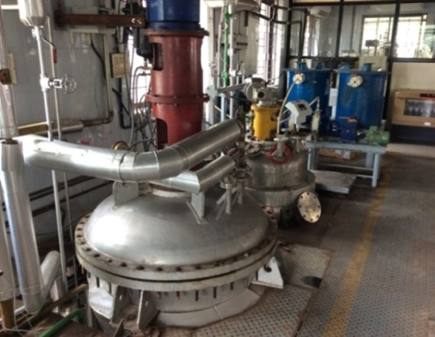
Integrated 2G ethanol pilot plant
NIIST’s Pilot plant for bioethanol from lignocellulosicbiomass was commissioned in 2012 and is one of the first 2G ethanol pilot plants in the country. The plant has all operations from biomass milling to ethanol distillation and dehydration. Capacity = 80 kg biomass/batch.
High pressure pretreatment reactor – 1000L (Helical impeller, direct steam injection and jacket circulation)
Neutralization reactor – 750L (Paddle impeller)
Vibra-sifter (Solid liquid Separation) a Plate and Frame Filter
Hydrolysis Reactor – 500L (Paddle impeller, Jacketed)
Fermenter – 200L (150L working volume) and all accessories Distillation unit
The entire plant and individual equipment are available for contract R&D and scale up studies
Solid State Fermentation (SSF)Pilot Plant (Koji Room)
NIIST’s SSF pilot plant has the capacity to operate 100 production scale trays (~50kg moldy bran per batch). This is a fully climate-controlled chamber for operation at pre-decided temperature and humidity. This is a unique facility and one of the very few in the country.
Clean room with vinyl walls
HEPA filtered Air In& Out
Temperature range – 20 C to Ambient +5 C
Humidity – 40 – 85 % RH
BSL2 inoculation facility
800L capacity autoclave
Pilot scale Ceramic Membrane Filtration system for protein concentration – 5kDa filtration
The entire plant and individual equipment are available for contract R&D and scale up studies
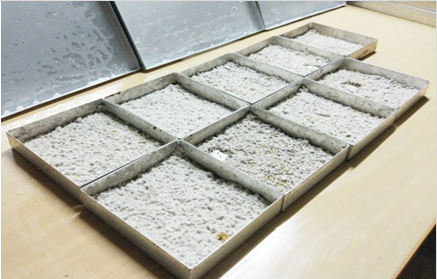
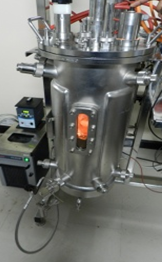
Fermentation facility
MPTD has fermenters ranging in volume from 0.5L capacity to 20L (Infors and B Braun/Sartorius), and with all utilities and accessories.
This would allow scale up of laboratory processes and the expertise in chemical engineering would aid process development and optimization. The facilities are available for contract R&D and our expertise is available for consultation.
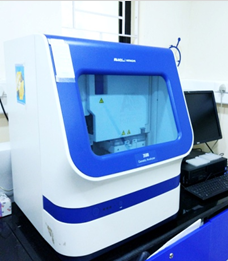
DNA Sequencer
Applied Biosystems, Genetic Analyzer 3500 Sanger Sequencing
DNA sequencing is routinely done for samples from the division and outside. DNA sequencing is offered as a service and can be requested here
Ultracentrifuge
Beckman Optima XPN 100 (Max Speed – 100000 rpm, 802000 x g)Rotors
100Ti Fixed Angle: 100000 rpm (802000xg) - 8 x 6ml
70Ti Fixed Angle: 70000 rpm (504000xg) – 8 x 39ml
SW41Ti Swing Bucket: 41000 rpm(288000xg)-6 x 13.2 ml
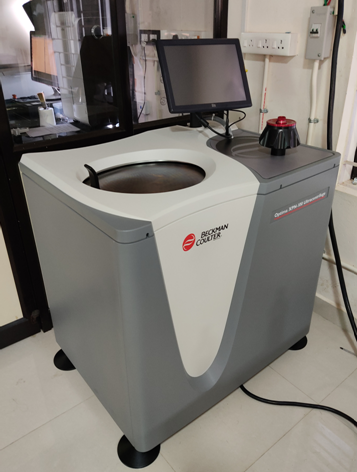
Other R &D Facilities
- HPLC Systems (Shimadzu)
- GC-MS (Shimadzu)
- GC system with FID (Shimadzu)
- Particle Size Analysers
- HPTLC (Chemag)
- Gel Documentation System (Biorad-Chemidoc)
- Epifluorescence microscope (Carl Zeiss)
- Digital Inverted Fluorescence Microscope (Thermo – EVOS Auto)
- Phase Contrast Microscopes (Leica)
- FTIR Spectroscope with ATR (Shimadzu-IR Tracer)
- Biochemical Analyzer (YSI)
- Multimode Reader (Tecan)
- Multimode Fluorescence reader (Tecan)
- Real Time PCRs (ABI, Biorad)
- Gradient PCRs (ABI, Eppendorff)
- Lyophilizer (Martin Christ)
- Ultra-low temperature (-80 C) freezers (Thermo, Haier)
- Nanoscale spectrophotometer (Nanodrop-Thermo)
- UV-Vis Spectrophotometer (Shimadzu)
- High Speed Centrifuges (Kubota, Sigma)
- Refrigerated Microcentrifuges (Eppendorff)
- Kjeldhal Nitrogen Analyzer
Achievements
-
Development of bioprocess for the production of alcohol from cassava.
-
Development of laboratory bioprocesses for the production of industrial and therapeutic enzymes, which include glucoamylase, alpha amylase, protease, lipase, L-glutaminase, xylanase, phytase, and inulinase.
-
Development of laboratory bioprocess for the production of L-glutamic acid, citric acid, aroma compounds and mushrooms.
-
Solid-State Fermentation (SSF) processes and systems
-
Process development for bioconversion of agro-industrial residues, in particular those available in the region.
-
Quality improvement of alcohol produced by a distillery with increased productivities.
-
A laboratory process on the development of two-stage anaerobic up-flow bioreactor for the treatment of digestion of natural rubber effluent.
-
Externally funded projects from the Government (DNES, DBT, DST, STEC, TMOP), Public (Chittur Distillery) and Private (Kedia) sectors as well as foreign agencies.
Mandate
- High quality R&D in the frontier areas of Biotechnology for a data-based generation of knowledge and its utilization for the mankind.
- Exploration and exploitation of regional resources through biotechnological interventions
Research list

Bioprocess and Products Development
-
Industrial enzymes
-
Leucine and methionine aminopeptidase
-
Proline aminopeptidasesBeta glucosidase
-
Nitrilase and hydantoinaseL-asparaginase
-
Esterase

Biopolymers & biosurfactants
-
Production of polyhydroxybutyrate (PHB)
Bioenergy
-
Feasibility of second generation biofuels in India
-
Availability of Indian biomass resources for exploitation
Bioethanol from lignocellulosic feedstocks
-
Pretreatment of biomass
-
Pretreatment of Douglas fir wood biomass for improving saccharification efficiencies
-
Pretreatment of biomass
-
Studies on enzymes for biomass hydrolysis
Health and Genomics
-
Nutraceuticals from lactic acid bacteria
-
Microbial production of amino acids
-
Pretreatment of biomass
-
Construction and screening of environmental DNA libraries for novel lipases
Mycobacterium research
-
Mannolipids and Mannose metabolism in Mycobacterium tuberculosis
-
Peptide processing enzymes of Mycobacterium tuberculosis
-
Microbial bioactives
New Books

Pretreatment of Biomass: Processes and Technologies, Editors- Ashok Pandey, S Negi, P Binod & C Larroche, Elsevier, UK, p 264(2015) ISBN: 978-012-800-080-9 There has been increasing focus on developing the processes and technologies for the conversion of biomass to liquid and gaseous fuels and chemicals, in particular to develop low-cost technologies. However, any kind of lignocellulosic biomass to be used for the conversion process needs at first some kind of pretreatment to fraction cellulose and/or hemicellulose, and/or to remove lignin. During last 3-4 years, there have been tremendous scientific and technological developments in the area. This book provides general information, basic data and knowledge on one of the most promising renewable energy sources, i.e., biomass for its pretreatment, which is one of the most essential and critical aspects of biomass- based processes development.

Advances in Thermochemical Conversion of Biomass, Editors- Ashok Pandey, Thallada Bhaskar, Michael Stocker & Rajeev Kumar Sukumaran, Elsevier, UK; p 491 (2015) ISBN: 978-0444-63289-0 This book covers one of the most important emerging areas related with alternative energy and deals with a wide variety of topics on the thermo-chemical conversion of biomass. There has been intensive R&D and technological developments in the area of renewable energy utilizing biomass as feedstock. Thermo-chemical processes offer potential benefits for the scale-up and commercial avenues.

Industrial Biorefineries and White Biotechnology, Editors- Ashok Pandey, R Hofer, MJ Taherzadeh, KM Nampoothiri & C Larroche, Elsevier, Waltham, USA; p 710 (2015), ISBN: 978-0-444-63453-5 This book intends to design concepts for modern biorefineries as an alternative and as an amendment to industrial crude oil and gas refineries and to give a complete review of the driving forces in modern industrial biotechnology and biochemistry. During last one decade, there have been tremendous scientific and technological developments in the area of biorefining, including industrial processes and products development using ‘green technologies’, often referred as white biotechnology. Hence, this book on the topics merging industrial biorefinery and white biotechnology would be of immense use for the researchers, including biotechnologist and bioengineers. This book provides data-based scientific information on the most advanced and innovative processing for the industrial biorefinery and white biotechnology. It presents an state-of-art review about the fast developments and new achievements in industrial biotechnology and the necessities and potentials generated by different kinds of biomass in presumably more decentralized biorefineries

Novel Combustion Concepts for Sustainable Energy Development,Editors- AK Agarwal, Ashok Pandey, AK Gupta, SK Aggarwal & A Kushari, Springer, New Delhi, India, p 562 (2015) ISBN: 978-81-322-2210-1 This book comprises research studies of novel work on combustion for sustainable energy development. It offers an insight into a few viable novel technologies for improved, efficient and sustainable utilization of combustion-based energy production using both fossil and biofuels. Special emphasis is placed on micro-scale combustion systems that offer new challenges and opportunities.


